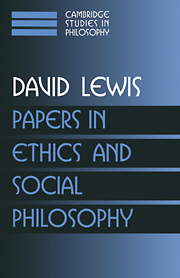Book contents
- Frontmatter
- Contents
- Introduction
- 1 Semantic analyses for dyadic deontic logic
- 2 A problem about permission
- 3 Reply to McMichael
- 4 Why ain'cha rich?
- 5 Desire as belief
- 6 Desire as belief II
- 7 Dispositional theories of value
- 8 The trap's dilemma
- 9 Evil for freedom's sake?
- 10 Do we believe in penal substitution?
- 11 Convention: Reply to Jamieson
- 12 Meaning without use: Reply to Hawthorne
- 13 Illusory innocence?
- 14 Mill and Milquetoast
- 15 Academic appointments: Why ignore the advantage of being right?
- 16 Devil's bargains and the real world
- 17 Buy like a MADman, use like a NUT
- 18 The punishment that leaves something to chance
- 19 Scriven on human unpredictability (with Jane S. Richardson)
- Index
18 - The punishment that leaves something to chance
Published online by Cambridge University Press: 24 December 2009
- Frontmatter
- Contents
- Introduction
- 1 Semantic analyses for dyadic deontic logic
- 2 A problem about permission
- 3 Reply to McMichael
- 4 Why ain'cha rich?
- 5 Desire as belief
- 6 Desire as belief II
- 7 Dispositional theories of value
- 8 The trap's dilemma
- 9 Evil for freedom's sake?
- 10 Do we believe in penal substitution?
- 11 Convention: Reply to Jamieson
- 12 Meaning without use: Reply to Hawthorne
- 13 Illusory innocence?
- 14 Mill and Milquetoast
- 15 Academic appointments: Why ignore the advantage of being right?
- 16 Devil's bargains and the real world
- 17 Buy like a MADman, use like a NUT
- 18 The punishment that leaves something to chance
- 19 Scriven on human unpredictability (with Jane S. Richardson)
- Index
Summary
We are accustomed to punish criminal attempts much more severely if they succeed than if they fail. We are also accustomed to wonder why. It is hard to find any rationale for our leniency toward the unsuccessful. Leniency toward aborted attempts, or mere preparation, might be easier to understand. (And whether easy or hard, it is not my present topic.) But what sense can we make of leniency toward a completed attempt – one that puts a victim at risk of harm, and fails only by luck to do actual harm?
Dee takes a shot at his enemy, and so does Dum. They both want to kill; they both try, and we may suppose they try equally hard. Both act out of malice, without any shred of justification or excuse. Both give us reason to fear that they might be ready to kill in the future. The only difference is that Dee hits and Dum misses. So Dee has killed, he is guilty of murder, and we put him to death. Dum has not killed, he is guilty only of attempted murder, and he gets a short prison sentence.
Why? Dee and Dum were equally wicked in their desires. They were equally uninhibited in pursuing their wicked desires. Insofar as the wicked deserve to be punished, they deserve it equally. Their conduct was equally dangerous: they inflicted equal risks of death on their respective victims. Insofar as those who act dangerously deserve to be punished, again they deserve it equally.
- Type
- Chapter
- Information
- Papers in Ethics and Social Philosophy , pp. 227 - 243Publisher: Cambridge University PressPrint publication year: 1999
- 3
- Cited by



